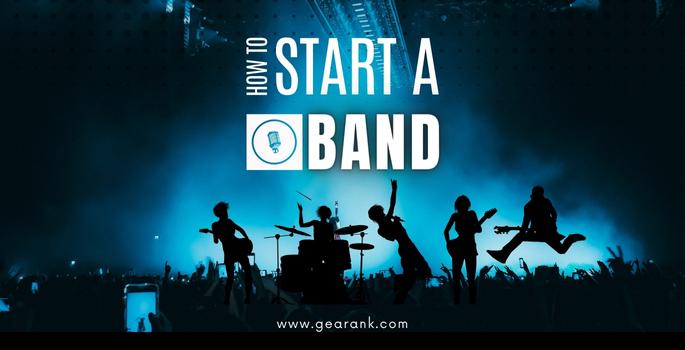How To Start a Band If You Have Decided to Get Serious

How To Start a BandIt starts with a genuine love for music, which prompts you to find the right people with the same passion and commitment to an agreed upon musical vision. |
I always found playing in a band more enjoyable than going solo. However, starting a band can be a daunting task.
It requires time, coordination, commitment, and communication between team members. So, how can you start a band?
Successful bands need key things to get off the ground, such as choosing the right bandmates and rehearsal space.
If you're a solo musician looking to start your own band, here's my step-by-step guide.
Step 1: Find New Band Members
Starting a band requires finding people you can collaborate with for an extended period.
Since a band is a long-term project, you must be highly selective when choosing your prospective band members.
Ideally, you want to find like-minded musicians who share the same goal of making music. If your music involves DJing, find someone who knows how to DJ.
While it is natural for people to argue sometimes, you need to find people who either already play in a band or with whom you have a pre-existing connection.
It can be easy to forget that you will be spending many hours with your band members, so it is important that you get along with them.
Apart from the character of your other band members, you also need to assess their music style and skill set.
This means you must choose people who can play the instruments required for your genre.
Guitarists are usually the easiest to find, bassists are also somewhat abundant. Usually, the tricky part is recruiting a drummer and keyboardist.
How To Find Bandmates
You can use several methods to find new bandmates, such as putting up flyers or posters. Additionally, you can post on social media platforms like Facebook groups or Instagram stories.
Based on my experience, word-of-mouth is the most effective way to find band members.
As a musician, you have a natural network of other musicians you know, especially those who play the same instrument or genre as you.
If you already know a few people who may be interested, it is much easier to connect with them and ask if they're willing to join your band.
Step 2: Agree On A Name For Your Band
When starting a band with other artists, one of the exciting parts is selecting a band name. You may already have some ideas, or you can brainstorm while writing songs. But make sure that you hear your bandmates ideas.
One effective technique is to gather everyone in a room and create a list of potential band names. You will likely come up with several pages of names. Cross out anything that sounds strange or doesn't fit your band.
A good band name should be easy to spell and relatively short. You could even choose a name from your favorite songs, as long as it is unique and original.
Ultimately, you should have around ten names that feel right, and you can visualize yourself with these names. You can then hold a vote for each name and narrow the list.
It is also essential to check if your chosen band names already exist. Just google them and see what comes up. If nothing shows up, you know your name is unique, and you're not competing with other bands or businesses online.
Aside from finding your potential band name on search engines and social media, check the Trademark Office to ensure your name is on track. As a band, you'll need to think about marketing (though this comes later), so ensure your potential band name works as a URL.
Step 3: Find A Rehearsal Space
If you play guitar or another instrument, you already have a place to practice. It could be your basement, a community venue, or your garage - there are plenty of options for rehearsal space.
Depending on the size of your entire band, ensure you have enough room to spread out comfortably and that the space is fully soundproof.
You should also consider the acoustics of your rehearsal location. Many bands opt for professional rehearsal spaces, which is a great option, although expensive.
Step 4: Sign A “Band Agreement”
Every successful band has disagreements and fights, even top bands like Guns n Roses. The main reason bands break up is serious disagreements over the band's vision, money, and other terms.
To reduce the risk of a breakup, creating a band agreement that each member should sign is helpful.
Remember that a band is not just about playing music with your friends; it's a serious business, especially when you start playing small gigs for money.
However, you shouldn't ask everyone to sign the agreement too early, as it may scare away potential members who might want to join you.
You must agree on three key elements in your band contract: band responsibilities, time commitment, and finances.
Agree On Band Responsibilities
If you have never been part of a band, you may not know each member has specific responsibilities. Generally, there are four key roles: the bandleader, the rehearsal director, the public relations manager, and the bookkeeper.
Bandleader
The band leader is responsible for the overall management of the band. They are the point of contact for journalists, labels, and venues.
They also have the final say in making decisions regarding the band, including hiring or firing members in case of serious disagreements.
Typically, the lead vocalist also assumes the role of the bandleader in most bands, although this is not always the case.
Rehearsal Director
The rehearsal director is responsible for managing the band's rehearsal time, performances, and song arrangements. While outlining the focus areas for the band, the director should work in agreement with other band members.
PR Manager
Most bands have a public relations manager who handles their social media pages and press coverage, including creating a press kit.
This individual is responsible for promoting the band by designing flyers, writing bios for each band member, and arranging photoshoots.
Bookkeeper
The bookkeeper manages the band's finances, including budgeting and equipment procurement.
Set Out Time Commitment For Each Member
In your band agreement, it's important to include the amount of time each member can contribute. This should cover practice time, organizational or administrative tasks, and performances.
Agreeing on specific dates and times can be difficult, so allowing enough time to organize everything is important.
Each band member should clearly understand their expectations regarding practice times and gigs.
Agree On The Financials
As a bandleader, I have learned that while music is the heart of every band, it is crucial not to overlook finances. Determining who pays for what and where the money will come from is important.
To keep it fair, I suggest creating a pool for expenses where each member contributes the same amount. The money comes from this pool whenever a member needs to buy some gear.
Additionally, it is crucial to set out how much everyone will get paid, when, and in what way (e.g., direct deposit, check, or cash).
Before starting to write music, it is important to answer the question of who owns the songs created by the band. The owner(s) of the song typically receive publishing royalties.
Some bands have a sole songwriter, while others split the royalties evenly. Alternatively, you can also decide individually with each new material created.
Step 5: Choose Your Genre
It's important to find the right sound for your band, and this is a process that naturally happens over time. However, you can intentionally shape your band's genre by discussing your influences with your band members at your first band meeting.
Try to explore what artists inspire you and what music genres you have in common with your bandmates.
There is no right or wrong answer here; practice together to see what works for your band. Remember that instrumentalists can change their playing style, but it can be difficult for singers.
So, having the right lead vocalist for your chosen genre is important.
Step 6: Create The Right Look For Your Band
A band is similar to a business in that it requires a brand and a distinctive look to promote its music and its members as musicians.
Although you can dress however you like during rehearsals, it's important to come up with a unique band look for your first few gigs that will capture your audience's attention.
As performers, you want to put on a memorable show. You can draw inspiration from other artists and closely examine their style.
In addition, you'll need a stylish band logo that communicates the essence of your music. Once you have your band look, you can begin creating your merchandise.
Step 7: Write New Songs
As you organize your band's administrative tasks, you may already feel inspired to start writing your first song.
To help with the songwriting process, try getting creative, playing covers, listening to your favorite tracks, and playing with other talented musicians.
I understand how complex songwriting can be. However, staying positive and focused can help you create your own songs, original and quality material.
Remember, you need at least 12 songs to headline a gig, but it's better to have a few great songs than a dozen mediocre ones. Take time with the entire process and meet regularly with your bandmates to address any issues.
Once you have your songs ready, securing a copyright for them is a good idea. While this may not prevent others from stealing your ideas, it does give you legal ownership.
Step 8: Record Your First Demo
Now that you have created a great band name and written a few songs, it's time to start recording demos. A demo is crucial to showcase your music to venues when you are ready to perform live.
The organizers of the events need to listen to your music before they can make a decision. If you don't have your recording equipment, you can hire a recording studio to record your songs.
Once the recording is done, edit the songs into short audio clips you can share with venues, promoters, and event organizers.
In addition to recording your own material for demos, you can also play covers. Many popular bands started as a cover band, and developed their own style while re-arranging cover songs.
Step 9: Start Searching For Gigs
To start your music career with live performances, you must contact local venues and convince them of your ability to play music and entertain audience.
To do this, you must assemble an "EPK" (Electronic Press Kit), which includes your music, music videos, band photos, bios of members, contact information, and social media profiles.
Creating a website is also a great way to get started, which you can add to over time with any press coverage and material.
Remember that you may need live sound equipment for larger gigs, such as a spare PA system, as many venues need more than you need.
You are responsible for bringing all your equipment, including guitar amps for your lead guitarist, pickups, and clip-on mics.
Although the first gig can be nerve-wracking, once you get on stage, you'll quickly forget all the difficulties and focus on the music.
Step 10: Promote Your Band
I previously suggested ways to promote your band, such as using social media to share your music online, and creating your own website. However, you can use many other methods to spread the word about your band in your local area to secure more gigs.
For instance, you can print flyers to give around local music stores and related areas, talk about your music on the radio, or join music podcasts. It's important to market each new song you release.
When I formed a band, I established connections with various artists in our local music scene, and created a network of people who could help us secure gigs.

Final Thoughts
Starting a band can be an exciting journey, but it's important to remember that playing music should always be the top priority.
Whether you're a solo artist or part of a garage band, there's no right or wrong way to enter the music industry.
The initial steps, such as finding bandmates and setting up your band, may coincide depending on your situation.
However, a positive attitude and a genuine love for music are essential for success. With these qualities, you can achieve anything you want as a musician.
Frequently Asked Questions
Is It Hard To Start A Band?
Starting a band and creating original music can be an exciting and rewarding experience. However, it requires a lot of dedication, hard work, and a willingness to learn and grow as a musician.
It usually involves finding like-minded individuals with whom to collaborate and share creative ideas, deciding on a musical style and genre, and working on writing and rehearsing songs together.
While starting a band may not be too difficult, maintaining unity and staying true to the band's vision can be more challenging. I
t requires effective communication, compromise, and a shared commitment to the band's goals and values. Members must be willing to work through disagreements and conflicts, and be open to constructive feedback in order to grow and improve as a band.
Furthermore, building a fan base, promoting the band's music, and booking gigs can also be challenging tasks that require time, effort, and persistence.
However, with determination, creativity, and a passion for music, starting and maintaining a successful band can be a fulfilling and enriching experience.
What Age Should You Start A Band?
There is no specific age requirement to start a band. As long as you and your potential bandmates have a passion for music and the ability to play an instrument or contribute in some way, you can form a band at any age.
It's important to keep in mind that starting a band requires commitment, dedication, and a willingness to work together to create your own unique sound.
Whether you're a group of teenagers just starting out, or a group of seasoned musicians looking to collaborate, the most important thing is that you share a common goal and are willing to put in the time and effort needed to make your band a success.
How Do You Start A Band If You Don't Know Anyone?
If you're interested in starting a band but don't know anyone else who shares your passion for music, there are a few steps you can take to find potential bandmates.
One option is to reach out to your friends and family members and let them know about your plans. They might be able to introduce you to other musicians they know or even be interested in joining your band themselves.
Another option is to attend live music events such as gigs or open mic nights. This is a great way to meet other musicians in your area and get a sense of their style and skill level.
You can strike up conversations with other attendees and performers and let them know about your interest in starting a band. You might even be able to find other musicians who are also looking to form a band.
It's important to keep in mind that finding the right band members can take time and patience. You may need to attend several events or reach out to multiple people before you find the right fit.
However, by staying persistent and open to new opportunities, you can increase your chances of finding the perfect bandmates and starting a successful band.
Contributors:
- Alexander Briones - Editor
- Jerry Borillo - Illustrator












